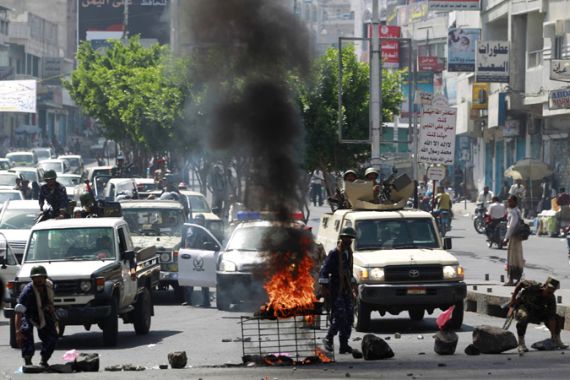Protesters wounded in Yemen clashes
Demonstrators continue call for ouster of president as Qatar withdraws from Gulf-sponsored talks, citing delays.

Yemeni government forces have opened fire at protesters in the city of Taiz, wounding dozens, according to witnesses and medics.
Security forces, using machine guns mounted on military vehicles, fired in the air as demonstrators were setting up roadblocks along a main street in the city on Thursday, a Reuters reporter said.
Leaders shouting on megaphones urged protesters to head to the main road to reinforce demonstrators as clashes continued.
The injured were rushed to a field hospital in Freedom Square, the focal point of protests in Taiz.
Protesters calling for the ouster of president Ali Abdullah Saleh have camped out on Jamal Street this week, blocking the key artery.
Meanwhile, in the southern city of al-Baydah, security forces shot dead two protesters and wounded seven others, a witness said, as protesters set fire to the ruling party headquarters.
A day earlier, security forces killed at least 10 demonstrators, two of them in Taiz, bringing the overall
death toll from weeks of protests to more than 160, rights groups have said.
Gulf mediation
As the violence continued, Qatar announced its withdrawal from a Gulf initiative aimed at resolving the crisis in Yemen, Qatar’s state news agency reported.
Gulf states have sought to revive talks on a power transition to stem the bloodshed. But a Qatari foreign ministry official said Qatar was compelled to withdraw from the talks due to the delay in its signing.
“Qatar was forced to take this action because of the stalling in signing the proposed agreement …, the continued escalation, the intensity of the confrontations,” the Qatar News Agency reported.
Earlier, an opposition leader told Reuters that Abdullatif al-Zayanim, the secretary-general of the Gulf Co-operation Council, was due in the capital, Sanaa, on Saturday to try to resurrect a deal to end the crisis which fell through last month when Saleh refused to sign.
But a government official played down prospects of an imminent deal, saying only that al-Zayanim would come at some point next week to hear differing views on the deal, which would have eased Saleh out within a month after nearly 33 years in power.
Washington and Gulf Arab states, especially neighbouring Saudi Arabia, worry more chaos could allow al-Qaeda’s Yemen-based wing to operate more freely, and have been eager to implement the Gulf-brokered deal.
But the opposition said: “Arab and international silence to earlier killings by military forces run by Saleh gave a green light to continue in a more brutal way. The international community must take decisive measures to stop these massacres.”
The defence ministry website said on Thursday that Saleh was planning to deploy students of Yemen’s military academy to bulk up security forces dealing with the widespread protests.
Sporadic clashes have been on the rise recently between forces loyal to Saleh and some tribes that back the protests.
Tribesmen have blockaded Yemen’s oil- and gas-producing Maarib province for weeks, creating a fuel crisis in the country some shipping sources say is costing Yemen $3m a day in blocked exports that are the government’s main source of income.
But those pressures have hurt the local population just as much – fuel shortages mean dry parts of the country have not received water shipments and even Sanaa is grappling with power cuts that last up to 10 hours a day.
Food prices have skyrocketed and cooking gas quadrupled in a country where about 40 per cent of its 23 million people live on less than $2 a day.